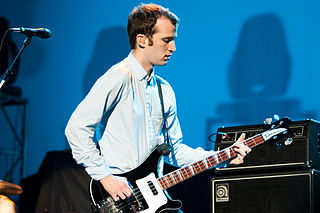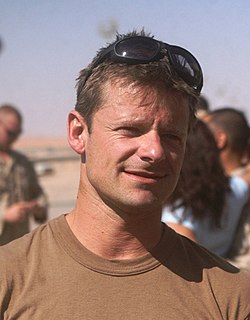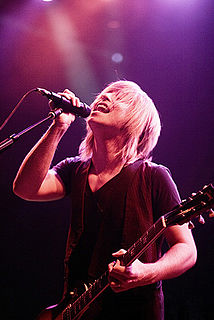A Quote by William Gibson
The culture is still there, and people are still doing it. I imagine some people are doing it very well indeed. As for me, it definitely was my native literary culture. Science fiction was where I'm from, but on the way to now, I went through a lot of other territory, and I wasn't really that culturally conventional an SF writer when I started.
Related Quotes
Literary science fiction is a very, very narrow band of the publishing business. I love science fiction in more of a pop-culture sense. And by the way, the line between science fiction and reality has blurred a lot in my life doing deep ocean expeditions and working on actual space projects and so on. So I tend to be more fascinated by the reality of the science-fiction world in which we live.
Everybody should read fiction… I don’t think serious fiction is written for a few people. I think we live in a stupid culture that won’t educate its people to read these things. It would be a much more interesting place if it would. And it’s not just that mechanics and plumbers don’t read literary fiction, it’s that doctors and lawyers don’t read literary fiction. It has nothing to do with class, it has to do with an anti-intellectual culture that doesn’t trust art.
There's still people that do it poorly... and people that do it very, very well. I think there's still an incredible spectrum. I guess there's something that's appealing in it, in that everyone on some level is a DJ. But people still go to clubs, and there's still... it is interesting - with everyone having an iPod now - when music is so personalised and things like Pandora and making your own playlists, there's something really powerful about a room full of people all dancing to the same song.
You look at science fiction and look how often it talks about being alien, being alienated about the other. Look at the number of blue people - 'Avatar,' I'm looking at you. And it is now easier to find people of color in science-fiction literature and media, but the issues of representation are still really, really troubling.
You asked if I thought my fiction had changed anything in the culture and the answer is no. Sure, there's been some scandal, but people are scandalized all the time; it's a way of life for them. It doesn't mean a thing. If you ask if I want my fiction to change anything in the culture, the answer is still no. What I want is to possess my readers while they are reading my book ? if I can, to possess them in ways that other writers don't. Then let them return, just as they were, to a world where everybody else is working to change, persuade, tempt, and control them.
At some point I started getting published, and experienced a meager knock-kneed standing in the literary world, and I started to get almost everything that many of you graduates are hoping for--except for the money. I got a lot of things that society had promised would make me whole and fulfilled--all the things that the culture tells you, from preschool on, will quiet the throbbing anxiety inside you. I got some stature, the respect of other writers, even a low-grade fame. The culture says these things will save you, as long as you also manage to keep your weight down. But the culture lies.
It had also been my belief since I started writing fiction that science fiction is never really about the future. When science fiction is old, you can only read it as being pretty much about the moment in which it was written. But it seemed to me that the toolkit that science fiction had given me when I started working had become the toolkit of a kind of literary naturalism that could be applied to an inherently incredible present.
I see what those people are doing with computers and it's just the new way of doing things and I don't look down on them for it, it's kind of funny that there are a lot of people - and I don't even care, this isn't me being like "well I do this" - but there are definitely people who are like: "Yeah I played all that."
I did a lot of things that I regretted and I certainly paid for my mistakes. You have to go and ask for forgiveness and it wasn't until I really started doing good and doing right, by other people as well as myself, that I really started to feel that guilt go away. So I don't have a problem going to sleep at night.
I started doing cocaine to get through interviews, 'cause people wanted to know a lot about my personal life and I wasn't prepared for a 60 Minutes interview every time. Doing bumps I was able to get through the day, but then I would smoke weed to calm me down - it was the only way I could get through the day without people noticing I was doing it.
I'm now much more excited about genre distinctions. What I still see breaking down are more the hierarchical arrangements of genres. That is, "There is literary fiction, and then there are lesser genres." I'm much more clear on the idea that literary fiction is itself a genre. It is not above other genres. It is down there in the muck with all the other genres, and it's doing the wonderful things that it does, but to give it a Y-axis, to make it high and low, just seems absurd. I stand by that.
What writers of fantasy, science fiction, and much historical fiction do for a living is different from what writers of so-called literary or other kinds of fiction do. The name of the game in F/SF/HF is creating fictional worlds and then telling particular stories set in those worlds. If you're doing it right, then the reader, coming to the end of the story, will say, "Hey, wait a minute, there are so many other stories that could be told in this universe!" And that's how we get the sprawling, coherent fictional universes that fandom is all about.





































